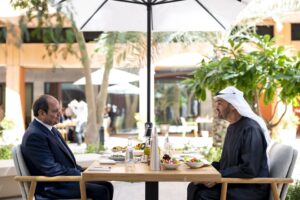Chinese and Egyptian FMs Discuss Strengthening Bilateral Ties and Middle East Crisis

Beijing, The Gulf Observer: Chinese Foreign Minister Wang Yi held a phone conversation on Tuesday with Badr Abdelatty, Egypt’s Minister of Foreign Affairs, Emigration and Egyptian Expatriates. Wang, who is also a member of the Political Bureau of the Communist Party of China Central Committee, emphasized that under the strategic guidance of Chinese President Xi Jinping and Egyptian President Abdel Fattah el-Sisi, the comprehensive strategic partnership between China and Egypt has achieved significant development and is at its best period in history.
Wang highlighted Egypt’s significant position in China’s overall diplomatic strategy, noting the success of President el-Sisi’s state visit to China in May. During this visit, the two heads of state laid out a blueprint for the development of bilateral ties. Wang urged both countries to seize this opportunity to fully implement the important consensus reached by the two leaders and work towards building a China-Egypt community with a shared future in the new era.
Abdelatty pointed out that this year marks the 10th anniversary of the establishment of the China-Egypt comprehensive strategic partnership, and cooperation between the two sides in various fields is showing positive momentum. He expressed Egypt’s willingness to work with China to implement the important consensus reached by the two heads of state, strengthen high-level exchanges, and elevate bilateral relations to display broader prospects and bring more benefits to the people of both countries.
The two sides also exchanged views on the situation in the Middle East, with a particular focus on the Gaza conflict. Wang expressed concern over the severe humanitarian crisis resulting from the conflict, noting that despite the United Nations Security Council’s adoption of a ceasefire resolution, hostilities have yet to subside. He condemned the assassination of Hamas Politburo Chief Ismail Haniyeh in Tehran, which has escalated the regional situation, and stated that China resolutely opposes such acts that violate the basic principles of the UN Charter, infringe on Iran’s sovereignty and dignity, undermine peace efforts, and hinder the attainment of a ceasefire in Gaza.
Wang emphasized that retaliatory violence leads to a vicious cycle and exacerbates tensions, calling for a consistent and clear position on the Palestinian issue. In response to the Gaza conflict, China has proposed a three-step initiative: achieving a comprehensive ceasefire, promoting post-war governance in Gaza under the principle of “the Palestinians governing Palestine,” and effectively implementing the two-state solution.
Abdelatty expressed deep concern over the escalating situation in Gaza, emphasizing that the assassination of Haniyeh complicates efforts to reach a ceasefire agreement and may lead to a full-scale regional war. He stressed that the Middle East can no longer bear more conflict and instability and called for the international community to work together to prevent further escalation.
Abdelatty praised China’s important role in promoting peace in the Middle East and appreciated China’s efforts to promote internal reconciliation in Palestine. He reiterated Egypt’s hope to maintain close cooperation with China to prevent further escalation of the situation.

